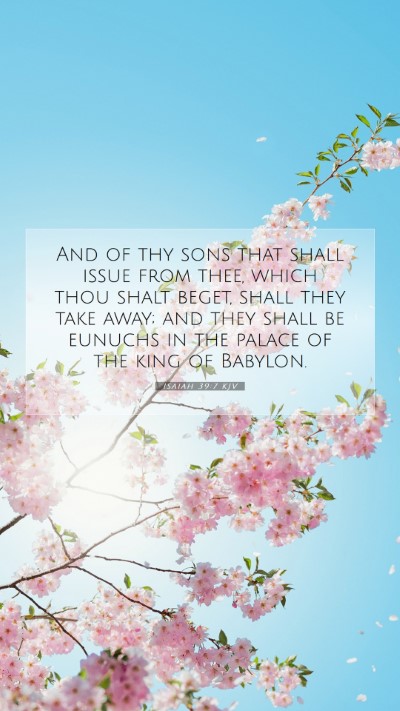Understanding Isaiah 39:7
Isaiah 39:7 states: "And of your sons who will issue from you, whom you will beget, they will take away; and they will be eunuchs in the palace of the king of Babylon."
Scripture Analysis and Explanation
This verse, part of the narrative concerning King Hezekiah's interaction with the envoys from Babylon, addresses the consequences of his actions. Let's break down the significance of this verse using insights from several public domain commentaries.
Commentary Insights
-
Matthew Henry:
Henry points out that this prophecy serves as a warning of impending judgment and the tragic consequences that would fall upon Hezekiah’s descendants. The mention of eunuchs reflects a loss of lineage and honor, indicating deep humiliation for Judah.
-
Albert Barnes:
Barnes elaborates that this message reveals God’s displeasure over the pride displayed by Hezekiah when receiving the Babylonians. He emphasizes how the glory of Judah would be taken away, affirming that the actions of any leader have ramifications for future generations.
-
Adam Clarke:
Clarke offers insights into the historical context, reminding readers that this prophecy was fulfilled during the Babylonian captivity. Clarke emphasizes the gravity that these events have in terms of spiritual lessons, highlighting the danger of alliances with foreign, especially idolatrous, nations.
In-Depth Analysis of Verse Meaning
The prophecy in Isaiah 39:7 goes beyond its immediate historical context. It provides a deep well of insight into how God's judgment operates in the framework of biblical narratives and how personal actions can lead to communal consequences. Reading this passage involves considering the following elements:
1. Historical Context
The verse comes after Hezekiah displays the treasures and splendors of Judah to the Babylonian emissaries. This act of pride leads God to reveal through Isaiah the consequences of such folly, thereby serving as a cautionary tale.
2. Themes of Judgment and Mercy
Throughout Scripture, we observe a duality of God’s judgment against sin and His mercy toward those who repent. Isaiah 39:7 is a profound illustration of the need for humility and awareness of one's relationship with God.
3. Long-term Consequences
The ramifications for Hezekiah’s sons becoming eunuchs highlight how the sin of pride can affect subsequent generations. This speaks to the broader biblical theme of familial responsibility and the importance of modeling godliness.
Application of Isaiah 39:7 to Daily Life
For those seeking Bible verse explanations or understanding Scripture, Isaiah 39:7 encourages reflection on personal actions and their broader impacts. Engaging with this verse can lead to significant insights, such as:
- Evaluating personal pride and its potential to lead to spiritual downfall.
- Recognizing the importance of legacy and how one's choices affect future generations.
- Understanding the necessity of remaining humble and faithful to God’s calling.
Cross References
Isaiah 39:7 resonates with several other significant biblical passages:
- 2 Kings 20:18: Another account of the prophecy concerning Hezekiah.
- Isaiah 14:22-23: Discusses God's judgment on Babylon.
- Jeremiah 39:6-7: Describes the fulfillment of the prophecy regarding the captivity of the Judah's descendants.
Conclusion
In conclusion, Isaiah 39:7 serves as a reminder of the nuanced relationship between human actions and divine response. It illustrates themes of judgment, responsibility, and the importance of humility before God.


